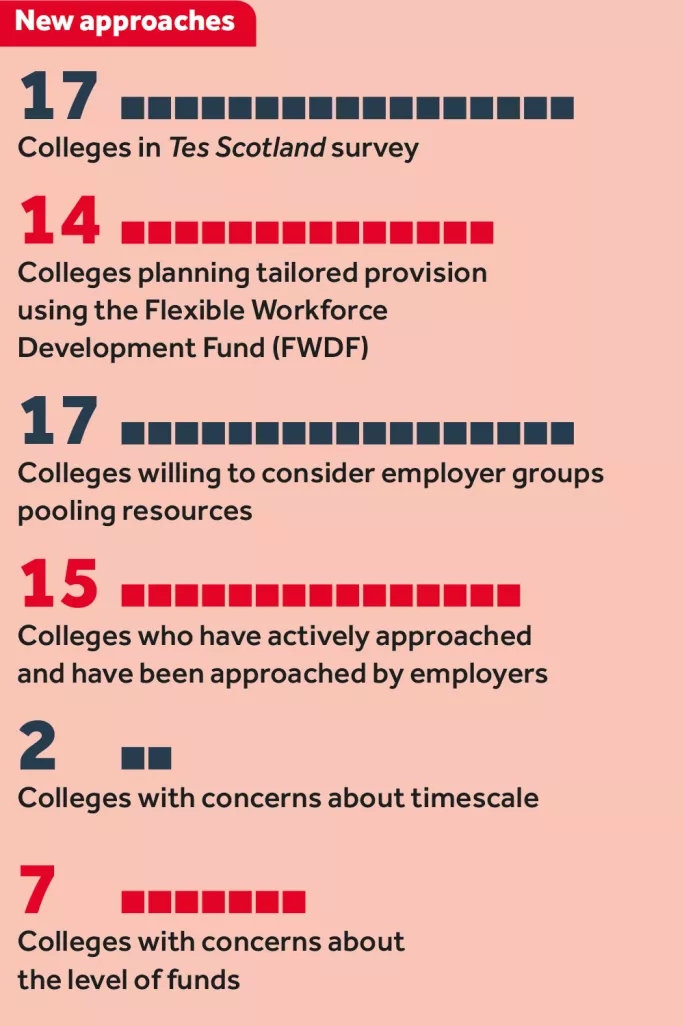Deadline extension gives upskillers room to breathe

The Scottish government has confirmed the deadlines for its new fund to upskill the country’s workforce will be extended. This comes as the leader of a body representing businesses told Tes Scotland that the fund was too small and the timescale too tight to allow employers and colleges to work together.
Hugh Aitken, director of CBI Scotland, made his comments as an exclusive survey revealed that, while most colleges already have plans to develop tailor-made programmes for employers using this fund, they also have concerns whether the cap of £10,000 per employer is sufficient - with one even criticising an “arbitrary” and “back of a fag packet” approach.
In September, the government announced that employers could apply for part of the new £10 million fund to partner with colleges on in-work skills training. It added that the Flexible Workforce Development Fund (FWDF) would be available to organisations across the private, public and third sectors who are subject to the UK government’s apprenticeship levy, introduced this year to fund growth of the apprenticeship system in England.
Bespoke programmes
In Scotland alone, the levy is expected to raise more than £220 million this year. According to the Scottish government, the one-year pilot fund will focus on the upskilling and re-skilling of existing employees, with organisations able to apply for up to £10,000.
In a survey carried out by Tes Scotland, 14 of 17 colleges that responded said they had plans for bespoke programmes to meet the needs of individual employers - and all would consider creating these for groups of employers that pooled their resources.
All but two colleges also said they had already approached employers and had been approached by businesses in their region about the fund. However, half of colleges had some concerns about whether the £10,000 per employer was sufficient, while two had concerns about the timescale of the fund.

Mr Aitken said that the announcement of the fund was a step forward for the skills system in Scotland, allowing businesses to decide what training investment is most appropriate for their needs. “It’s encouraging to hear that many colleges are taking a proactive approach to engaging with employers,” he added. “We need colleges to be responsive to business needs. Supporting firms to upskill their staff is crucial to driving up productivity across Scotland.”
However, he said the 15 December deadline for companies to apply for funding and the June 2018 deadline for the completion of training did not allow much time for employers and colleges to work together to create and deliver meaningful training opportunities.
“The bigger problem remains that the fund itself is very small in comparison to the size of the skills challenge firms face,” said Mr Aitken. “For it to be a success, we need to see a much greater portion of levy funds allocated to it in the future.”
Timescale problem
A spokesman for North East Scotland College said: “The £10,000 cap is considered very small for many employers, given the amount of levy many are paying. Some employers would like more funding, but perhaps the bigger problem is the extremely tight timescales that colleges are expected to secure proposals and deliver training to employers.”
A spokesman for Lews Castle College UHI said that the £10,000 allocation and £3 million criteria appear to be entirely “arbitrary” and “back of a fag packet” measures.
He added: “The initiative is a good one but it is not flexible enough for training organisations to improve their local skills base.”
A Dundee and Angus College spokesman added that the majority of levy-paying organisations would spend significantly more on training per year than the value of this fund. He added: “This does, however, provide the employer with an opportunity to enable [their training budget] to go further - particularly if the business is offering apprenticeships, as this funding is additional to the FWFD fund.”
The timescale of the fund would make it less likely for employers to pool their resources, said a spokesman for Edinburgh College - although the college would consider tailoring programmes specifically for such employer groups. A spokesman for West College Scotland said it had already approached more than 100 employers directly and had started a social media campaign around FWDF.
A Scottish government spokeswoman said the Scottish Funding Council had now written to all colleges extending both the window for employer applications and the date by which applications must be agreed on the Flexible Workforce Development Fund pilot.
“This will allow eligible employers more time to access the fund and work with colleges to plan the upskilling and re-skilling of their workforce,” she said.
You need a Tes subscription to read this article
Subscribe now to read this article and get other subscriber-only content:
- Unlimited access to all Tes magazine content
- Exclusive subscriber-only stories
- Award-winning email newsletters
Already a subscriber? Log in
You need a subscription to read this article
Subscribe now to read this article and get other subscriber-only content, including:
- Unlimited access to all Tes magazine content
- Exclusive subscriber-only stories
- Award-winning email newsletters